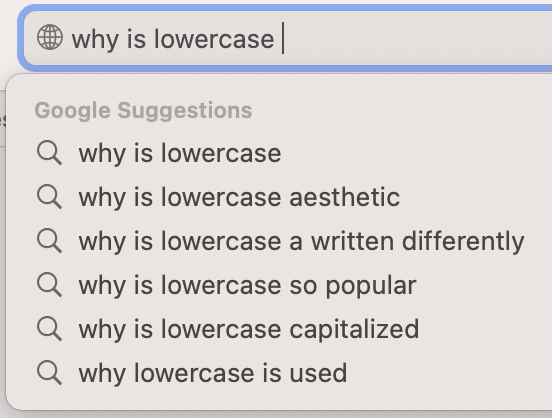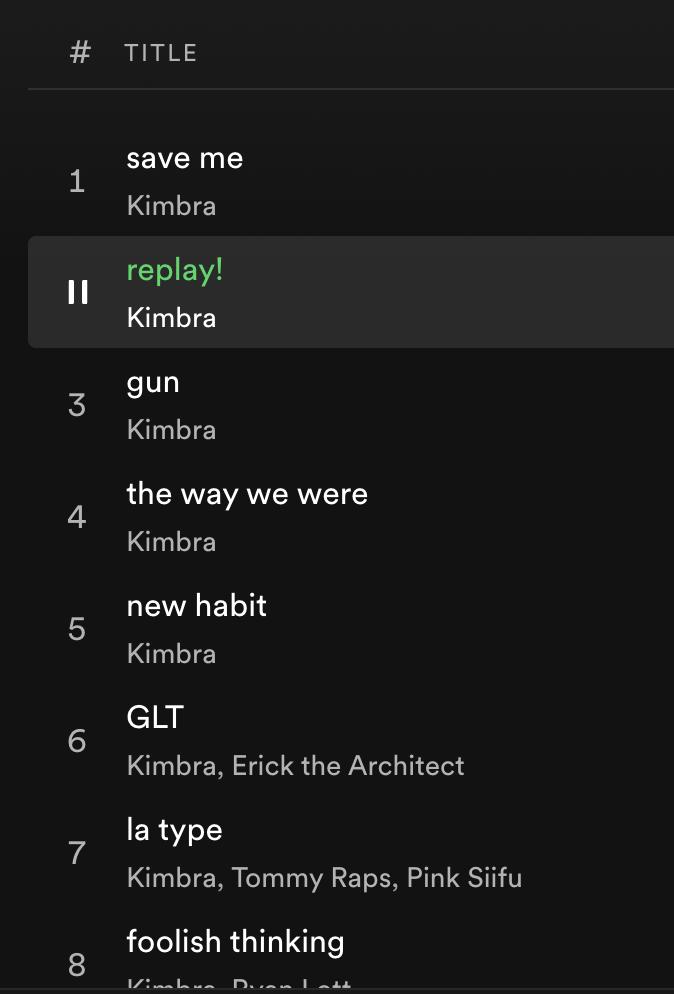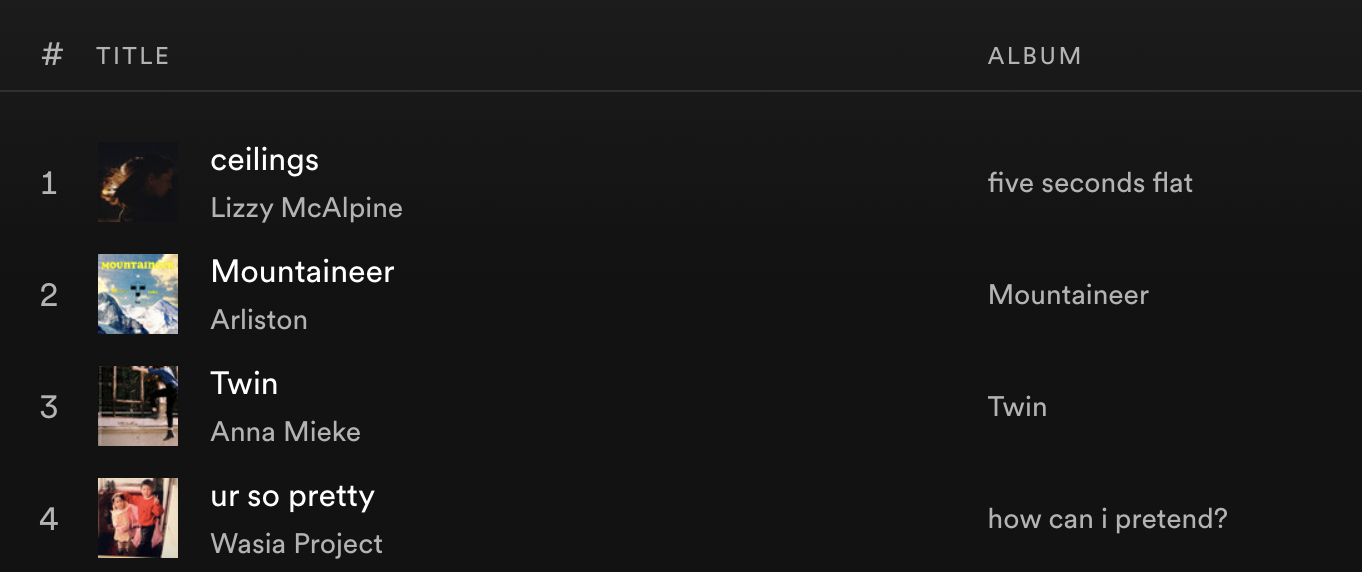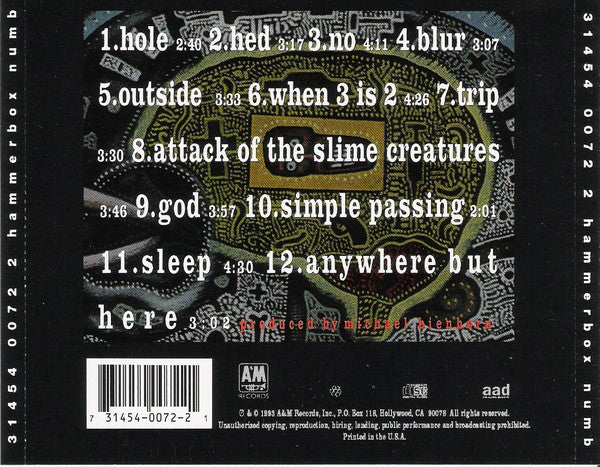Kids these days are speaking in lowercase on the internet.
I mean, kids were always speaking in lowercase on the internet; I dunno if it’s because it’s too much effort to hold down the shift key or if it’s because of the aesthetic or because of something else.
I remember messaging people on MSN Messenger in mostly lowercase in the early 2000s, maybe because I was trying to sound all caʒual. I have a Spotify playlist called i am a collector (lowercase), and am subscribed to one titled nineties (lowercase). The title of this blog is fabian writes, again, all lowercase; the links in the top right if you’re reading this on desktop is also lowercase. Hashtags are all lowercase. The screen titles on Windows Phone were all lowercase. My name i.r.l. is capitalised, but on the web it’s lowercase and prefixed with an at-symbol.

‘why is lowercase aesthetic’ is a sentence that wouldn’t have made any sense twenty years ago
I do not know why we write in lowercase. I wonder if I do it in instant messages because there’s already UI indicating the start of a message; I don’t need to extra announce that I’m starting a message with a capital letter.

People also ask
Here is a new album from Kimbra. It’s very good! And also: the track titles are all lowercase1.

Tracklist for ‘A Reckoning’, by Kimbra
After I’d noticed it, I started seeing lowercase track titles everywhere.

from the Spotify playlist The Most Beautiful Songs in the World
And I wondered if there was a trend. Maybe you’re wondering too?
A few hours of screwing around with a song database gave me this graph:
% of tracks released with lowercase names, 1990-2022
The percentages are small, but hmmmmmmmmmmm yep, looks like a trend! Let’s talk about the dataset rather than blindly jumping to any conclusions.
🧠 music for brainz
I sourced this data from MusicBrainz – an open music encyclopedia2. There’s something like 29 million recordings listed in MusicBrainz, and you can download info about all of them, load the data into a database and then run queries against it to produce pithy graphs like this.
MusicBrainz launched on my eleventh birthday, in the year 2000. Back in the 2000s, I used to buy CDs, then rip them to MP3 using Audiograbber, which could automatically grab track info from the Compact Disc Database / CDDB, and then upload the songs to my iRiver iFP-390T. The fact that the software could figure out the track titles of the album I’d inserted – and grab cover art! and embed that info into the mp3s! – felt like magic.
MusicBrainz, as far as I can tell, solves a similar problem to CDDB – it’s an attempt at cataloging every song that’s ever been recorded. All the data is user-supplied, wikipedia-style – and you can see traces of that by e.g. the fact that there’s so much more data for the years it’s been operating as the years before, and the kinds of recordings that show up in the list.
number of tracks released by year according to MusicBrainz, 1990-2022
It’s also not weighted by song popularity or significance in any way – in this database, Beyoncé doesn’t get any special treatment over South Coast NSW Indie Post-Punk band This Film’s For Bela. Your song has an entry if you have a single fan devoted enough to add it. Keep that in mind as we take a look at a history of lowercase track names in this dataset.
then – 1990
1990 has songs titled things like
- [bagpipe solo]
- 666 (edit)
- panic in my room
- [announcement]
“panic in my room” is a track from Rumi Shishido, and it’s listed in mixed case on Spotify. The track listing on the back of the CD also has it written in mixed case; so it appears to be that whoever punched it in to MusicBrainz didn’t care about the casing particularly.

[announcement] is a track from a bootleg recording of a Rolling Stones concert in Basel in 1990. [bagpipe solo] is in fact, a bagpipe solo, and in the album’s re-release on Spotify it’s listed as Bagpipe Solo 1 (oh yes, there are multiple bagpipe solos).
It seems like lowercase track titles in this collection in 1990 are more a data artifact than artistic choice; like they have something to do with the person who added the data to the DB rather than being a property of the track itself.
then – 2000
If we speed through to 2000, we start to see this change -
- www.nevergetoveryou
- www.youdontrok
- with(drawal)
- you need to say something
- (u)n(-)t(i)t(l)e(d)
There’s some very clear evidence of the early web influencing the way that people name their songs. Some of it is experimental electro, some of it is punk. www.youdontrok makes me twitch a little bit because I feel like it’s missing a .com or a .net, but the song is actually kinda fun.
then – 2010
By 2010, we’ve mostly stopped using poorly-formed URLs as song titles. But we’re doing emails sometimes:
- [email protected]
- no castle
- magic nails
- do the mario
Of the four songs I picked arbitrarily here, [email protected] is the only one that I can actually listen to on the internet today (it’s from a B-sides album from Minneapolis-based punk band, The Soviettes, listen to LP III). This is maybe data weirdness again – there’s much less music listed in earlier years on MusicBrainz, but I’d suspect that most of it’s still around. That doesn’t seem to be the case for 2010.
2010 seems like a weird vintage for music – released too late to be easily signed to a label, released too early to be eternally preserved on spotify, released just in time to get an entry on MusicBrainz.
now
2022 has songs titled things like
someday you will control the birds
(i kinda like this one actually)
and
gallons of spiders went flying thru the stratosphere
and
this insanely catchy ytpmv song is literally the only thing i know about doraemon
and
l o w l i g h t
and of course, the Kimbra album from before, and the tracks in the curated Spotify playlists. Nobody is using URLs or email addresses in their track names anymore, thank goodness (I checked).
but. why is it so?
It’s interesting to me that this is changing. It seems like we’ve gone from lowercase as data glitch/artifact -> lowercase because the internet was kool and people wanted to name tracks after websites and email addresses -> lowercase as aesthetic -> lowercase as a e s t h e t i c. On top of that, the data source that I’m using probably reflects the typing habits of the thousands of volunteers who added songs to MusicBrainz over the years, and the way that their habits and typing styles have changed (letter casing is exactly the sort of nuance that I’d imagine is easy to lose when you’ve got a human entering information by hand).
But I also wonder if there’s a story around fidelity and medium. We spoke about that song from 1990 that was incorrectly lowercased, but there are examples going in the other direction, too – I had a CD copy of Numb by Hammerbox, and distinctly remember the back of the cover listing everything in lowercase, despite the fact that the tracks are all in title case on streaming services nowadays.
Look at the album cover! The titles are clearly lowercase!

I think probably for older albums, it’s a question of how the metadata’s been stored – there’s no canonical digital representation of the album. You’d say the names of the tracks at concerts, but you can’t really announce that a track is all lowercase when you say it out loud. You had the version printed on the album art, but you didn’t have a way to say, as an artist,
hey this track is always spelled lowercase and thats very important; i havent just typeset it like that just for the album art; this track was inspired by the collected works of e. e. cummings; the track name is actually lowercase thx
And now, you do have a way to do that – not because people are more intent on preserving orthography as a dimension of expression, but because you upload your tracks to some service which publishes them to Spotify and Apple Music, and it just copies your bytes across blindly. The thing that the computers communicate is different to the thing that humans at record labels would’ve communicated; computers are weirdly literal in ways that humans are not. If you want to make these corrections, they have to be programmed explicitly, and as such, there’s an extra little channel in the data for your album that wasn’t there before, and another thing you’ve gotta make choices about as a consequence.
BUT WAIT THERE’S MORE
I also grew up listening to Battles, who have an entire album in UPPERCASE:
We can draw a similar graph for uppercase track names over time:
% of tracks released with UPPERCASE names, 1990-2022
Also a trend, but a less dramatic one. Following this through the years in detail is left as an exercise to the reader, but there’s a lot of:
- Titles that have been translated from scripts which don’t have a notion of case, notably, Japanese artists / albums are heavily represented in this dataset3.
- Roman numerals (also present, but less popular, in lowercase)
- Initialisms, e.g. M.L.K. by U2 and (probably the worst disco song of all time) D.I.S.C.O. by Ottowan.
- The occasional aesthetic yelling.
that is all
I’m pretty excited that datasets like this exist; this one in particular feels like it’s from a time before everything was mega mega centralised, and I love that it’s been kept up to data by volunteer efforts over the years. If you do anything similar with this dataset or just wanna speak really quietly let me know 💌
Or at least, they were when it was released! At some point in 2023, they were changed to Title Case - I wonder what happened? ↩︎
👨🏻💻 tech notes: I downloaded the dataset into a local postgres install using mbdata, and then categorized the tracks using a cursed set of regexes. Here’s the SQL. ↩︎
there’s probably enough info in the dataset to somewhat reliably exclude these, but it’s fiddly and messy, and I’ve spent too long on this already. ↩︎